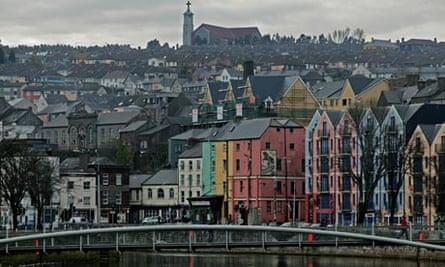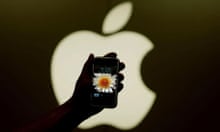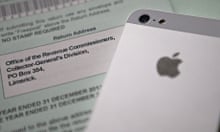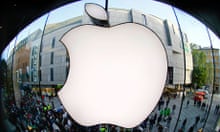Eileen Stokes and her family live a basic life, one of 16 Irish Traveller families settled on an established halting site at the edge of Knocknaheeny, a run-down northern suburb of Cork.
A brazier smolders outside their mobile home. Also within the small, breezeblock-walled yard is the family's much-loved horse, Ginger. Excitable children show off minnows they have caught in a jar and ask for photos to be taken of themselves posing as boxers or on horseback.
Eileen's husband pulls out a mobile phone to call his brother to come and talk to the Guardian. It's not an iPhone.
The Stokes are the nearest neighbours to Apple's Cork offices, just north of the Blarney Road. Almost two-thirds of the technology group's $34bn (£22.5bn) global profits for 2011 were earned by companies registered next door.
The past 10 years have brought "unprecedented success" as the popularity of its products has spread across the world, Apple chief executive Tim Cook recalled in Washington last week.
As a result, Apple's Irish companies now sit on reserves of cash and investments worth about $100bn – a corporate kitty that would more than cover Ireland's entire annual government expenditure.
Over the same 10 years, Ireland's fortunes have taken a different turn, with the country engulfed in a banking crisis and forced to seek a bailout from the EU and IMF. Between 2006 and 2011, unemployment rates in Cork city and its suburbs doubled to 18%. The area includes nine of the country's unemployment blackspots, the worst of which is Knocknaheeny, where the jobless rate according to the 2011 census was 43%.

"They never done anything for us," says Stokes, her husband adding that many staff at the offices are foreign rather than local workers. Knocknaheeny is an area with a history of many households living below the poverty line. Of those who work, many are low-paid.
On its multi-billion Irish company profits, Apple paid an average of less than 1% tax to Dublin, leading US politicians and tax professors to accuse the group – which vies with the oil giant Exxon for the title of the world's largest joint-stock company – of deliberately shuffling around its global profits in order to lower its tax bill.
These are earnings, tax experts say, that ordinarily would arise and be taxed, at Apple's Silicon Valley headquarters; and to a lesser degree in markets around the world, including the UK, where many millions have bought its products.
Foremost among Apple's accusers are two US senators: a formidable bipartisan duo of Carl Levin, a 78-year-old Democratic senator from Michigan, and John McCain, 76, the 2008 Republican presidential candidate.
Leading the Senate subcommittee on investigations, they discovered that international selling rights to Apple products had been transferred out of the US to a small handful of companies in Knocknaheeny.
"You shifted that golden goose to Ireland," Levin angrily accused Cook at a six-hour hearing last week. "You shifted it to three companies that do not pay taxes in Ireland … These are the crown jewels of Apple Inc … Folks, it's not right."
It was an interpretation Cook politely said he did not recognise. "There is no [profit] shifting going on that I see at all," the smiling Apple boss explained, sticking firmly to the company line.
"Apple has real operations in real places, with Apple employees selling real products to real customers. We pay all the taxes we owe – every single dollar … We don't depend on tax gimmicks."
But politicians and tax experts found this hard to believe. "Apple does not use tax gimmicks? I about fell off my chair when I read that," Dick Harvey, a professor in tax law and former adviser to the IRS, told the Senate hearing.
Probed specifically on activities in Ireland, Cook claimed: "We have built up a significant skills base there of people who really understand, deeply, the European market, that serve our customers well. They provide a number of functions for that … from tech support, to sales, to reseller support, etc. So we have quite a strong presence there."
With the two sides unable to agree, the Guardian went to Cork, seeking to build on evidence given to the Senate and test whether Apple's claim that its Irish subsidiaries can reasonably be said to earn two-thirds of global group profits – or whether, in truth, they are little more than a fig leaf masking industrial-scale tax avoidance.
The investigation found:
Apple's Cork site employs large numbers of foreign workers, many employed in call centres dealing with technical-support queries raised in their home countries. Recent Cork job adverts show vacancies for a Spanish payroll analyst, Nordic customer relations adviser, Norwegian Apple specialist, Russian fraud analyst and a German Agreement admin adviser.
Staff at what Cook calls "our campus in Cork" earned less than the average for Apple, though Harvard professor Stephen Shay has calculated that 2011 profit per employee at the Cork site was more than $9m.
Although Steve Jobs made Cork his first European base in 1980, most manufacturing operations left Cork years ago. Printed circuit-board production went to Indonesia in 1998, while iMac assembly transferred to Wales a year later.
Most Apple products destined for all markets outside of the Americas are manufactured by Foxconn in China on orders from Cork. Almost all of them never touch Ireland, being shipped directly to local distributors and retailers in Europe, the Middle East, India, Africa, Asia and Australia.
Apple has been able to draw a secrecy veil over its Irish operations by making extensive use of unlimited companies, which are not required to file company accounts.
Billions of dollars of profit pouring into Apple's Irish coffers each year are managed by Apple's Nevada-based investment subsidiary Braeburn Capital, making it larger than any US hedge fund. Cash reserves are held in banks in New York with not a penny in Ireland.
Main accounting records for at least one of these companies are held in Austin, Texas. Meanwhile, notes of board meetings are taken by Apple's California-based general counsel Gene Levoff and sent to a law firm in Ireland to be typed up as formal minutes.
Auditors to Apple companies are Ernst & Young, the accountancy firm that also audits Google, Facebook and Amazon – each of which have also elected to set up substantial operations in Ireland. E&Y did $6bn of tax advisory work last year.
Apple declined to co-operate with the Guardian's investigations and staff leaving work last week were told not to speak to the paper.
However, one worker did break ranks, although chose to speak anonymously. "I grew up in Denmark, so I come from a system where you pay 50% tax. So, yeah, I believe you should pay taxes – I would prefer to pay 50% and have a system that works," he said.
"I don't know how the Irish do it. I don't think it's fair, no. I think they [Apple] pay 2% tax here in Ireland, which is ridiculous – but that's the way the system works."
Conor Healy, chief executive of the Cork chamber of commerce, said Ireland's unapologetic drive to recruit multinationals was good for the local economy, insisting the country's low corporation tax rate of 12.5% was just one reason multinationals chose to relocate. "That's something we very much promote. But that, on its own, is not sufficient for large companies like Apple to be successful.
"Cork is the EMEA [European, Middle East and Africa] headquarters for Apple … It's delivering real services to Apple customers outside of the US and to the Apple corporation globally.
"And it is employing 4,000 real people, in real jobs here in Cork. That's a very, very different environment to the tax haven as portrayed in some of the commentary from the US."
Some 40 multinationals – including Amazon, Google and software security group McAfee – have set up operations in and around Cork, bringing 100,000 jobs to the area, according to Healy. And for every one of these new posts, he claims, three additional, indirect jobs are created.
In the last week, Irish ministers have been busy attempting to rebut damaging tax-haven accusations from the Senators. They have denied that Apple received a sweetheart deal from the Irish government, despite sworn testimony from Cook that Ireland, in 1980, was "very much recruiting tech companies … [and] did give us a tax incentive agreement to enter there".
Ireland's deputy prime minister, Eamon Gilmore, said: "[These] are not issues that arise from the Irish taxation system. They are issues that arise from the taxation systems in other jurisdictions, and that is an issue that has to be addressed first of all in those jurisdictions."
But Sheila Killian, a lecturer in accounting and finance at Limerick University and a former E&Y tax adviser, suggested it might not be so straightforward for Ireland to wash its hands of responsibility for tax controversies such as Apple and Google. Whatever the modest benefits to Knocknaheeny, Cork and Ireland, business-friendly tax policies, she argued, can having a corrosive impact on international efforts to stand firm against aggressive tax avoidance.
"I think the 12.5% rate in itself, when companies aren't engaged in [tax structuring], is not so problematic … But when profit is shifted into Ireland – and particularly when funds are channelled through Ireland, as appears to be the case for Apple and Google – then you have companies that essentially don't pay much tax anywhere. They're really bleeding tax from other jurisdictions, particularly [poorer nations in] the global south.
"Less money goes in aid to the south than flies from the south in capital. If you allow your tax system to be used by multinational firms to facilitate that kind of flight, that's very problematic."
Next month, David Cameron hosts a G8 summit in Northern Ireland and has promised to put tackling big business tax avoidance at the top of the agenda. In January, the prime minister used a speech at the World Economic Forum in Davos to signal his intent.
"Some companies navigate their way around legitimate tax systems, and even low tax rates, with an army of clever accountants," he said. "Some forms of avoidance have become so aggressive that I think it is right to say these are ethical issues, and it is time to call for more responsibility," the prime minister said, urging multinationals to "wake up and smell the coffee".
Meanwhile, Apple too – like Google earlier this month – has been calling for a reform of the international tax rules. Not everyone shares a view about what reform should look like, but political and public pressure for change, from around the globe, has never been stronger.







